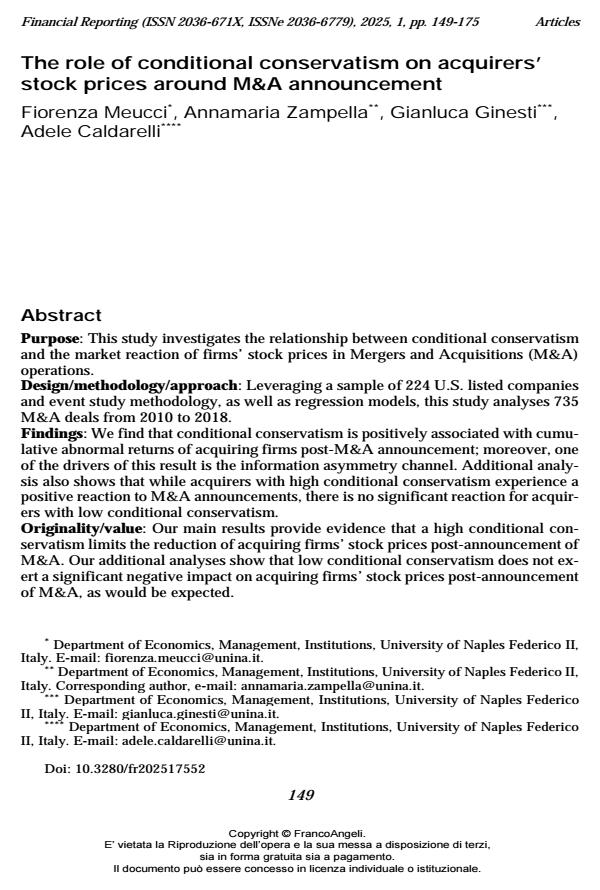The role of conditional conservatism on acquirers’ stock prices around M&A announcement
Journal title FINANCIAL REPORTING
Author/s Fiorenza Meucci, Annamaria Zampella, Gianluca Ginesti, Adele Caldarelli
Publishing Year 2025 Issue 2025/1
Language English Pages 27 P. 149-175 File size 258 KB
DOI 10.3280/fr202517552
DOI is like a bar code for intellectual property: to have more infomation
click here
Below, you can see the article first page
If you want to buy this article in PDF format, you can do it, following the instructions to buy download credits

FrancoAngeli is member of Publishers International Linking Association, Inc (PILA), a not-for-profit association which run the CrossRef service enabling links to and from online scholarly content.
Purpose: This study investigates the relationship between conditional conservatism and the market reaction of firms’ stock prices in Mergers and Acquisitions (M&A) operations. Design/methodology/approach: Leveraging a sample of 224 U.S. listed companies and event study methodology, as well as regression models, this study analyses 735 M&A deals from 2010 to 2018. Findings: We find that conditional conservatism is positively associated with cumulative abnormal returns of acquiring firms post-M&A announcement; moreover, one of the drivers of this result is the information asymmetry channel. Additional analysis also shows that while acquirers with high conditional conservatism experience a positive reaction to M&A announcements, there is no significant reaction for acquirers with low conditional conservatism. Originality/value: Our main results provide evidence that a high conditional conservatism limits the reduction of acquiring firms’ stock prices post-announcement of M&A. Our additional analyses show that low conditional conservatism does not exert a significant negative impact on acquiring firms’ stock prices post-announcement of M&A, as would be expected. Practical implications: This paper may be useful for both investors and practitioners since it offers interesting insights on how to deal with accounting policies and benefit from M&A transactions. Indeed, if they are informed on how conditional conservatism exerts a role on stock prices, they are less likely to engage in value-destroying M&A transactions. In addition, our results may interest standard setters interested in the role of the conservatism principle under the Generally Accepted Accounting Principles.
Keywords: conditional conservatism, market reaction, stock prices, acquirer firms, M&A, event study
Jel codes: M41, G14, G34
Fiorenza Meucci, Annamaria Zampella, Gianluca Ginesti, Adele Caldarelli, The role of conditional conservatism on acquirers’ stock prices around M&A announcement in "FINANCIAL REPORTING" 1/2025, pp 149-175, DOI: 10.3280/fr202517552